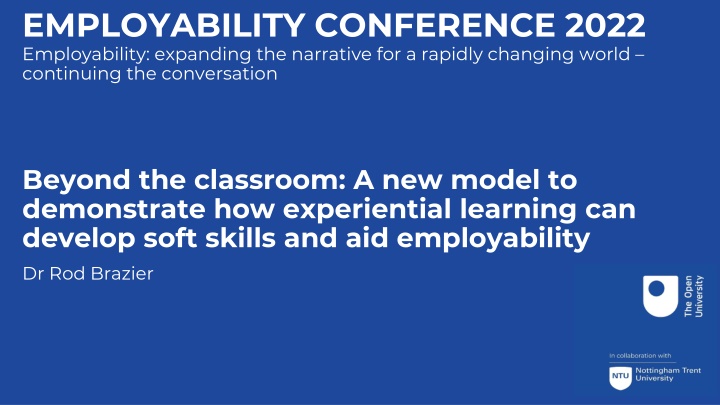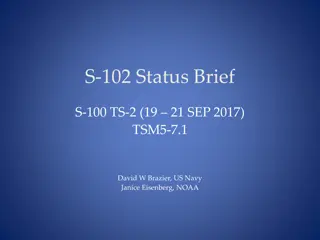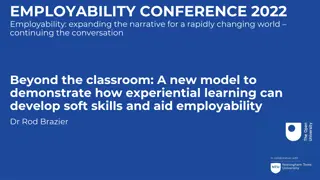
Developing Soft Skills and Employability Through Experiential Learning
Explore the impact of experiential learning on soft skill development and employability in a rapidly changing world. This literature review delves into the benefits of experiential education, degree apprenticeships, and professional thinking styles. Discover how models like the Learning Cycle Theory and WIL Definitions can enhance career readiness and provide students with a range of opportunities for growth.
Download Presentation

Please find below an Image/Link to download the presentation.
The content on the website is provided AS IS for your information and personal use only. It may not be sold, licensed, or shared on other websites without obtaining consent from the author. If you encounter any issues during the download, it is possible that the publisher has removed the file from their server.
You are allowed to download the files provided on this website for personal or commercial use, subject to the condition that they are used lawfully. All files are the property of their respective owners.
The content on the website is provided AS IS for your information and personal use only. It may not be sold, licensed, or shared on other websites without obtaining consent from the author.
E N D
Presentation Transcript
EMPLOYABILITY CONFERENCE 2022 Employability: expanding the narrative for a rapidly changing world continuing the conversation Beyond the classroom: A new model to demonstrate how experiential learning can develop soft skills and aid employability Dr Rod Brazier
Beyond the classroom: A new model to demonstrate how experiential learning can develop soft skills and aid employability Dr. Rod Brazier
Experiential Education Literature Kolb, 1984 Learning Cycle Theory
Experiential Education Literature CEWIL WIL Definitions, (updated 2020)
Experiential Education Literature Gibbons and Hopkins (1980) - scale of experientiality
Literature Review: Experiential Education and Business Management Moon (2004) reflection and autonomy Johnston & Sator (2017) experiential teaching models have high impact outcomes Levant et al (2016) active learning within business simulations can aid soft skill development Carolis & Litzky (2019) Experiential education gives entrepreneurship students range of opportunities
Literature Review: Degree Apprenticeships and Soft Skill Development Billet (2016) (i) Centrality of experiences can aide students within design of degree apprenticeship schemes & (ii) questioned whether education should move away from measurement and towards prioritising learner needs and employability Noone (2009) Professional thinking styles should be encouraged through real- world, authentic experiences Coonan & Pratt-Adams (2018) (i) Career- readiness will continue to grow in importance as skills shortgage exists & (ii) culture change necessary Chang & Rieple (2013) Variety of skills demonstrated by students in experiential projects
Research Problem Gaps in literature Lack of studies into effect of experiential education within Business Management programmes Research often focused on theory rather than detailed, practical, wide-ranging solutions No existing detailed exploration of the link between experiential education and the extensive potential for soft skills development within Business Management in UK HE context No study which considers this across undergraduate and degree apprentice programmes
Research statement and sub-questions Research Statement: An exploration of the nature of students soft skills development in the context of experiential education in contrasting business management undergraduate courses (RS1) Sub-questions: In what ways do students who are taught using experiential learning activities participate within their learning activities both inside and outside of the classroom? (RQ1) In what ways are experiential learning activities supported by teachers? (RQ2) What soft skills are developed in the context of experiential learning activities both inside and outside of the classroom? (RQ3) What are the relationships between experiential learning activities and soft skill development in the context of different course routes? (RQ4)
Methodology Nested case study Epistemology Constructionism reality is socially, collaboratively constructed Naturalistic a study of the spontaneous with a directed flow Emergent reality and meaning emerged from data Theoretical perspective - Symbolic Interactionism society is constructed through human interaction Theoretical analysis used theory from the literature as a narrative to shape the study Thematic analysis themes emerged from me constantly moving back and forth between the data making subjective meanings
Methods Preliminary Field Notes Researcher Observations Student Reflective Journals Semi-structured Focus Group Interviews Artefacts (documents, student work)
Findings Range of soft skills were developed by students who participated within experiential project 11 themes and 39 sub-themes of soft skill Experiential activities facilitated soft skill development Nature of teacher facilitation affected soft skill development Soft skills developed both within and externally to the classroom setting Reflexivity, student-led learning and autonomy affected students soft skill development
Conclusions Students who are taught using experiential learning approaches participate within their learning activities in a variety of ways both inside and outside the classroom (Addressing RQ1) Experiential learning is supported by teachers who are pro-active, brave and who encourage students to learn autonomously through student-led learning (RQ2) Range of soft skills are developed through experiential education both inside and outside the classroom. These skills are advanced when facilitated through autonomous, student-led learning (RQ3) Experiential learning can lead to soft skill development for students in the context of different course routes (RQ4)
Contributions to the field A synthesis of different ideas, brought together into a single model - ExpEd Framework (major contribution of study): ExpEd = (IntEx + ExpAct + SLL = SSD) Integrated Experiential Education Approach Wheel - IntEx wheel (sub- contribution) Taxonomy of Experiential Activity - ExpAct (sub-contribution) Relationship between Student-led learning and soft skill development SLL (sub-contribution) An offering of practical guidance through a proof of concept on how experiential education can foster soft skill development (practical contribution)
Learning designer is responsible for: Teacher is responsible for: Student is responsible for: Outcome generated: ExpAct SLL IntEx SSD + = + The Experiential Approach Framework formula: IntEx + ExpAct + SLL = SSD
Learning designer is responsible for: Teacher is responsible for: Student is responsible for: Outcome generated: Integrated Experiential Approach Experiential Activity Student-Led Learning + + = (ExpAct) (SLL) (IntEx) Soft Skill Development (SSD) Experiential Approach Framework - ExpEd
The combination of experiential approach, classroom activities and the method and degree of student engagement culminates in the development of a range of soft skills A range of interchangeable Experiential approaches are available for learning designers Which are then developed through a variety of experiential classroom activities To be undertaken by students in a variety of ways Core Soft Skills are Developed Less Student- Led Learning (SLL) Directed and/or Ambiguous roles = Less SSD Directed. Teacher- Led Activities (TLA) Low Traditional UCAS Students Inside Classroom Assessment Focus reflexivity 1. Active Learning 7. Authentic Learning 2. Work-based Learning Reflexivity is a Cause and Individual Roles Impact Student-Led Learning Effect on and of SSD Development Location Upon SSD Cohort + Focus + = Task 6. Problem- based Learning 3. Collaborative Learning Soft Skill 5. Service Learning Less Directed TLA. Student-Led Learning Project Focus Degree Apprentices Outside Classroom 4. Co-Operative Learning Actively negotiated & well-defined roles = More SSD More High Student-Led Learning (SLL) reflexivity Advanced Soft Skills are Developed
A range of interchangeable Experiential approaches are available for learning designers Core Soft Skills are Developed Less Student- Led Learning (SLL) Directed and/or Ambiguous roles = Less SSD Directed. Teacher- Led Activities (TLA) Low Traditional UCAS Students Inside Classroom Assessment Focus reflexivity 1. Active Learning 7. Authentic Learning 2. Work-based Learning Reflexivity is a Cause and Individual Roles Impact Student-Led Learning Effect on and of SSD Development Location Upon SSD Cohort + Focus + = Task 6. Problem- based Learning 3. Collaborative Learning Soft Skill 5. Service Learning Less Directed TLA. Student-Led Learning Project Focus Degree Apprentices Outside Classroom 4. Co-Operative Learning Actively negotiated & well-defined roles = More SSD More High Student-Led Learning (SLL) reflexivity Advanced Soft Skills are Developed
The combination of experiential approach, classroom activities and the method and degree of student engagement culminates in the development of a range of soft skills A range of interchangeable Experiential approaches are available for learning designers Which are then developed through a variety of experiential classroom activities To be undertaken by students in a variety of ways Core Soft Skills are Developed Less Student- Led Learning (SLL) Directed and/or Ambiguous roles = Less SSD Directed. Teacher- Led Activities (TLA) Low Traditional UCAS Students Inside Classroom Assessment Focus reflexivity 1. Active Learning 7. Authentic Learning 2. Work-based Learning Reflexivity is a Cause and Individual Roles Impact Student-Led Learning Effect on and of SSD Development Location Upon SSD Cohort + Focus + = Task 6. Problem- based Learning 3. Collaborative Learning Soft Skill 5. Service Learning Less Directed TLA. Student-Led Learning Project Focus Degree Apprentices Outside Classroom 4. Co-Operative Learning Actively negotiated & well-defined roles = More SSD More High Student-Led Learning (SLL) reflexivity Advanced Soft Skills are Developed
The combination of experiential approach, classroom activities and the method and degree of student engagement culminates in the development of a range of soft skills A range of interchangeable Experiential approaches are available for learning designers Which are then developed through a variety of experiential classroom activities To be undertaken by students in a variety of ways Core Soft Skills are Developed Less Student- Led Learning (SLL) Directed and/or Ambiguous roles = Less SSD Directed. Teacher- Led Activities (TLA) Low Traditional UCAS Students Inside Classroom Assessment Focus reflexivity 1. Active Learning 7. Authentic Learning 2. Work-based Learning Reflexivity is a Cause and Individual Roles Impact Student-Led Learning Effect on and of SSD Development Location Upon SSD Cohort + Focus + = Task 6. Problem- based Learning 3. Collaborative Learning Soft Skill 5. Service Learning Less Directed TLA. Student-Led Learning Project Focus Degree Apprentices Outside Classroom 4. Co-Operative Learning Actively negotiated & well-defined roles = More SSD More High Student-Led Learning (SLL) reflexivity Advanced Soft Skills are Developed
The combination of experiential approach, classroom activities and the method and degree of student engagement culminates in the development of a range of soft skills A range of interchangeable Experiential approaches are available for learning designers Which are then developed through a variety of experiential classroom activities To be undertaken by students in a variety of ways Core Soft Skills are Developed Less Student- Led Learning (SLL) Directed and/or Ambiguous roles = Less SSD Directed. Teacher- Led Activities (TLA) Low Traditional UCAS Students Inside Classroom Assessment Focus reflexivity 1. Active Learning 7. Authentic Learning 2. Work-based Learning Reflexivity is a Cause and Individual Roles Impact Student-Led Learning Effect on and of SSD Development Location Upon SSD Cohort + Focus + = Task 6. Problem- based Learning 3. Collaborative Learning Soft Skill 5. Service Learning Less Directed TLA. Student-Led Learning Project Focus Degree Apprentices Outside Classroom 4. Co-Operative Learning Actively negotiated & well-defined roles = More SSD More High Student-Led Learning (SLL) reflexivity Advanced Soft Skills are Developed
Learning designer is responsible for: Teacher is responsible for: Student is responsible for: Outcome generated: Experiential Pedagogic Approach Effective Experiential Teaching Active, Autonomous Learning + + = Soft Skill Development The ExpEd Guide
Learning designer is responsible for: Teacher is responsible for: Student is responsible for: Outcome generated: Practical ways in which students could lead their own learning include ExpEd Framework could be set up like this Activities could include this + + = Soft skills which are developed (from basic to advanced) The ExpEd Tool


